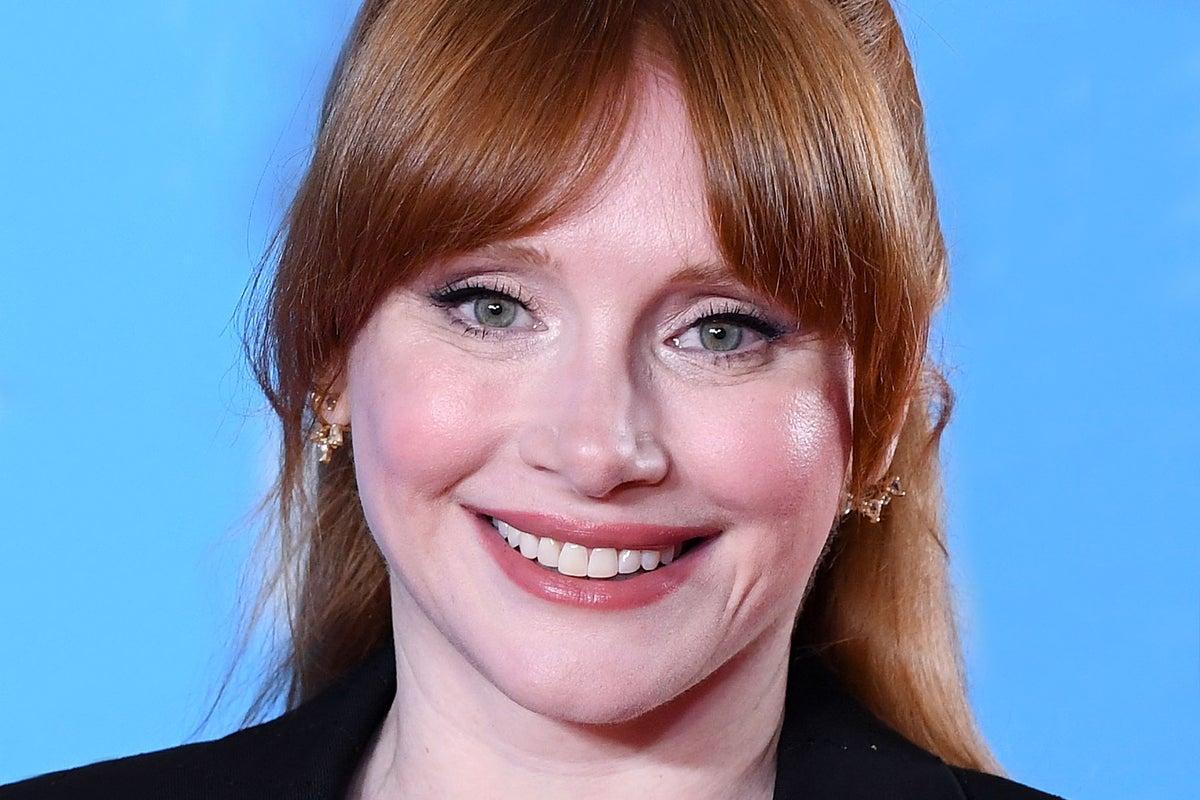
Bryce Dallas Howard has leapt to her feet, laughing wildly. “Whenever I’m on set, I’m just obsessed with danger.” She throws her arms from side to side. “I want danger! I want people impaled! I want a high body count!” A chorus of her assistants and colleagues, sitting with us in a London hotel suite, hoot in recognition. “I want bodies on the wall!” Howard exclaims, “I want dismemberment!” Remember the Darksaber scene in The Mandalorian, she asks. I don’t! (She doesn’t hear me.) “It was so important to me that we saw it slice a body in half. No cutaways. No shadows. You had to see it. Because in storytelling, peril is powerful.” Howard smooths out her jacket and returns to her seat, point made. “Oh God, I can already see the headline,” she says. “‘Bryce Dallas Howard is a sick f***’. Hahahaha!”
I could never get away with that. But it’d at least be more succinct than “Bryce Dallas Howard, M Night Shyamalan muse turned Jurassic World boffin turned director behind a whole bunch of Star Wars TV shows, is actually far more delightfully kooky than you might imagine”. That’s too much of a mouthful. But, as proven by a bit of time in her company, it is largely true.
A little like her father Ron, the director behind a vast and eclectic catalogue of modern classics including Splash, Apollo 13 and Frost/Nixon, Howard has typically been defined by her sturdiness: always dependable, never unwelcome, a true-blue, gold-star Hollywood worker-bee. But that reputation feels limiting, and does her a disservice as an actor. Glance over her 20 years of credits and you’ll be reminded of the ethereal terror she brought to Shyamalan’s The Village, the comic mania of her work in the Black Mirror episode “Nosedive”, or the very English disappointment she embodied so powerfully in the Elton John biopic Rocketman. Is it a surprise to learn that she’s also a big advocate for on-screen carnage and wrote a school paper on man’s inclination towards violence at the age of 12? Yes! But really it’s our fault for not discovering it sooner.
At the end of a day of press for her new Prime Video comedy Deep Cover, Howard’s enthusiasm doesn’t seem to be flagging. She careens between incredibly animated excitability – hand gesticulations, laughter, impressions – and more sober business-speak, and while I’m sure I’ve read somewhere that people with red hair age far better than anyone else, I’m struck by the fact that Howard still looks about 25. She’s actually 44, and I’m slightly floored when she casually mentions that her son – she has two children, Theo and Beatrice, with the actor Seth Gabel – graduated from high school just a few days earlier.
We’re talking about violence because Deep Cover is unexpectedly full of it. It revolves around three struggling, London-based improv comedians (Howard, Ted Lasso’s Nick Mohammed and a revelatory Orlando Bloom) who are recruited by Sean Bean’s police detective to go undercover and bust low-stakes criminal operations – apparently, actual coppers aren’t too great with on-the-spot ad-libbing. The restless trio hesitantly say yes, only for the operations to become increasingly bloody and labyrinthian, the group ending up in a tangle with kingpins played by Ian McShane and Paddy Considine. It’s entirely ridiculous, but also very funny and British, full of slightly Gervaisian cringe comedy and elaborate comic set pieces involving corpses and brain splatter. As if she hadn’t driven it home enough already, Howard absolutely loves the morbid.
“When I was growing up, I had a lot of difficulties learning and communicating,” she remembers. “I was always very happy and smiley, but not extremely verbal. It was unclear what intelligence was there, and how much I was really processing.” Her parents took her to a psychologist, who later sat them down to talk about their findings. “Can we talk about the dead babies?” the therapist would ask. “Because Bryce talks a lot about dead babies.” Howard erupts into laughter.
Growing up as a ‘kid-of’, I’m very used to being around a flurry but not being at the centre of it. Like, everybody’s getting very excited about someone here… and that someone is Ron Howard
It wasn’t as bad as it sounded, she insists. She just loved a bit of dystopian fiction, some Handmaid’s Tale, 1984 and Shirley Jackson – anything vaguely macabre she had to get her hands on. “I was such a messed up kid – I would walk around the Disney lot reading about euthanasia. But I also wasn’t dark. There was just a sort of intensity to my feelings and the stories I was curious about.”
Inevitably, Howard had a very different childhood to you or me. Through her father, she grew up on film sets. She was always told to stay away from the actors so as to not disturb them, so would instead set up shop with the camera department, the first assistant directors and the sound guys, soaking up every corner of movie-making. It wasn’t until she was in high school that she even entertained the prospect of acting herself.
One of the main threads for Kat, Howard’s character in Deep Cover, is how often she is told to give up on her dreams – they provide some of the film’s funniest moments, Howard wincing her way through pass-agg interactions with a parade of smug, Motherland-style mums. Howard says she never experienced that sort of thing herself when she was starting out, but that her parents made it clear that she needed to train, learn her craft and support herself through work. “I felt very lucky because I never had it in my head that if I wasn’t making a living from acting, I was then failing,” she says. But she also always knew that her circumstances were exceptional. “I’m a third-generation performer,” she says (her grandparents were the actors Rance and Jean Speegle Howard). “The layers of privilege that I’ve experienced means that there’s a lot that I’m aware of [about the industry], and there’s a lot that I will never be able to understand because of that.”
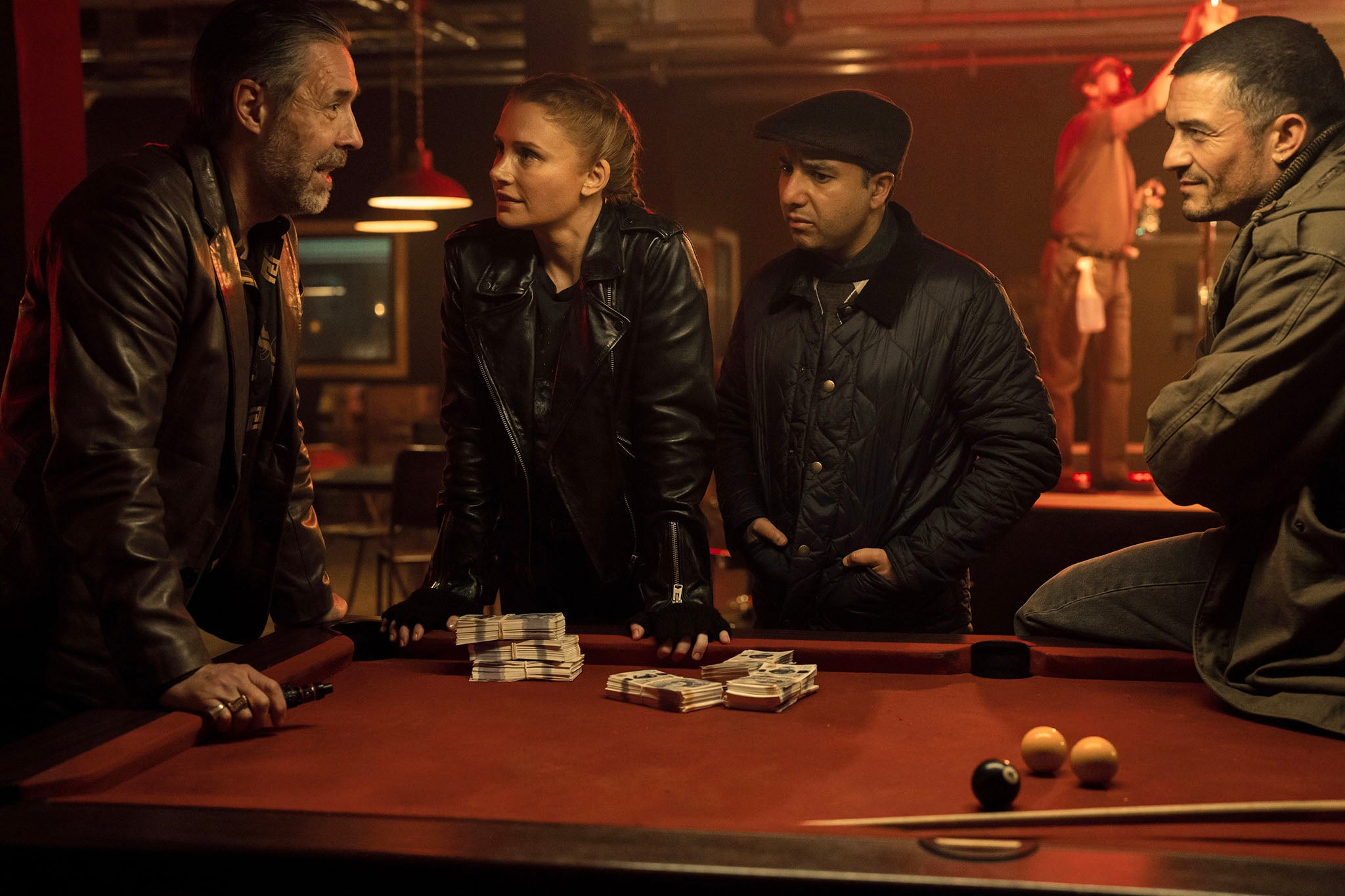
Howard was just 22 when Shyamalan, based solely off the performance she gave as Rosalind in a Broadway production of As You Like It, offered her the starring role in The Village. He’d say he was struck by her innocence, her “American purity”, presumably unaware of all the euthanasia stuff. She played a blind teenager living in an odd, 19th-century (ahem) community menaced by creatures in the woods, and the film – arriving at the tail end of Shyamalan’s largely bulletproof early run of twisty thrillers – propelled her to instant fame. She says now that she found it an incredibly stressful time, and that she once hid under the bed covers in her hotel room during the press tour due to sheer overstimulation. “I remember being, like, ‘I can’t handle the light!’” She cringes. “It was ridiculous.”
She came back down to earth the week of the film’s release, which happened to coincide with her husband’s big break – while she starred in The Village, Gabel had just begun a recurring role as an incestuous sociopath on the plastic surgery drama Nip/Tuck. Howard remembers dressing up to the nines to go to the supermarket with him. “I’m in heels in this grocery store, looking really cute and walking incredibly aware of myself. Seth’s just in his pyjamas. And then there’s this guy who comes up to us who is hugely excited. I’m entirely ready to be fawned over, and he says to Seth, ‘Oh my God, were you on Nip/Tuck this week?’ It happened two more times right after in this same store, and not a soul said anything to me.” She shakes her head, clasping her hands to her face. “It was such an absurd moment – literally, what I was thinking?”
It was weirder, she says, because she didn’t even covet fame. But she assumed that her regular life was about to drastically change – ultimately, though, it didn’t. “The reality is that I hardly ever get recognised to this day,” she says. “I live a totally normal life – partly because I’m a shut-in and don’t leave the house that much, but I’ve also just been incredibly lucky. I was never followed around by photographers. My kids were never stalked. I was never interesting enough. I would not sell enough magazines.”
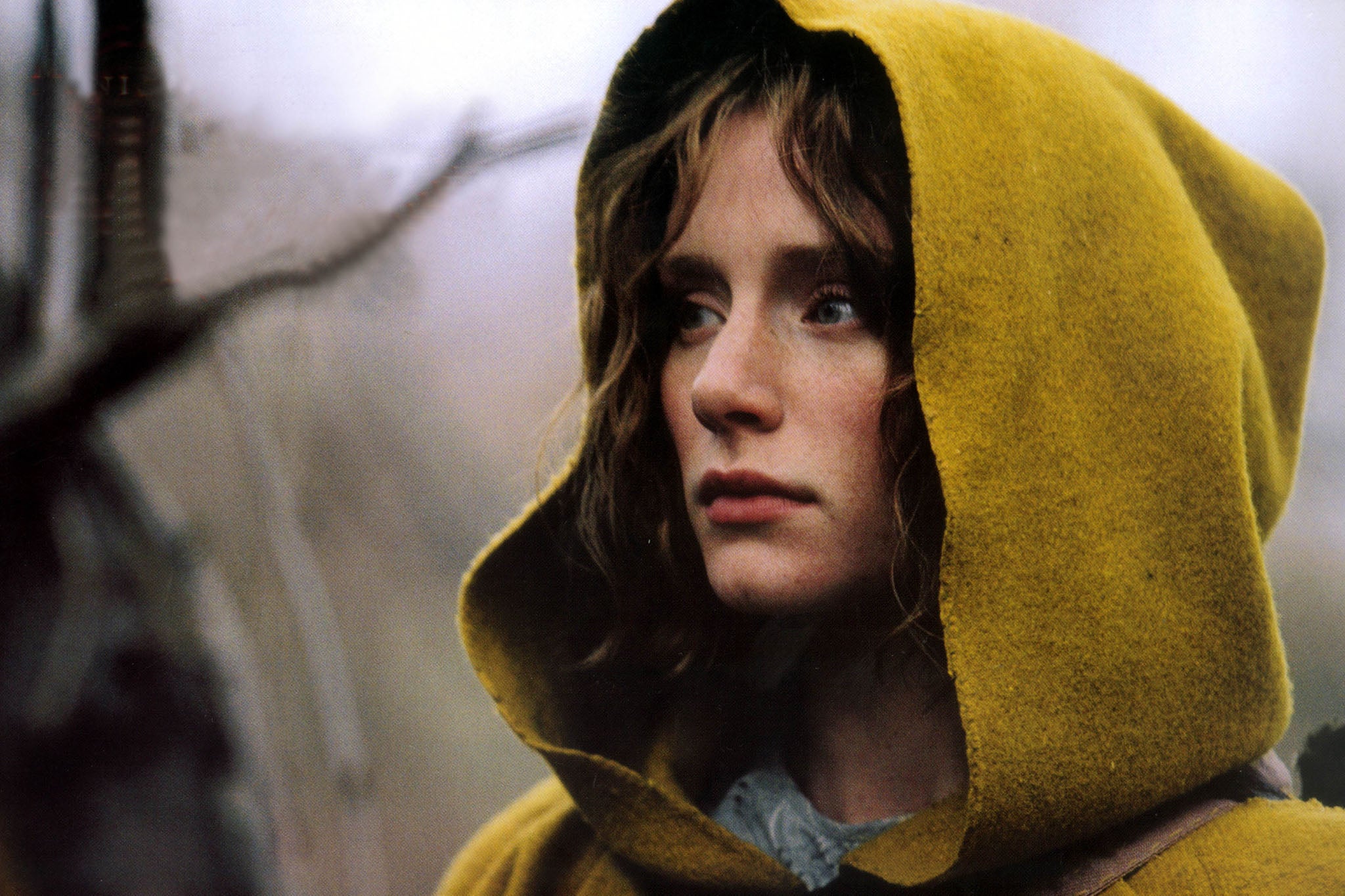
In Howard’s filmography, there is a period right after The Village that seems a lot darker and more experimental than the work she’d principally end up doing – she’s haunting in Lars von Trier’s Dogville sequel Manderlay, and delightfully vindictive as a Southern belle in the Tennessee Williams adaptation The Loss of a Teardrop Diamond. But then the franchises started to dominate – she was Gwen Stacy in the maligned Spider-Man 3, and played supporting roles in a Terminator movie and a Twilight film. Everything got a little PG. “I love feelgood,” she says. “But now I very much want a mix of it all – I want to make things that are intense but also provide uplift. I think I realise now that you can do both of those things at once. I don’t want to make movies about miserable people living miserable lives in Miserable-town, USA. I’ll watch those movies, sure, but I can’t make them.”
Her choices over the years also reflect her reluctance to properly lead a movie, she says. “Growing up as a ‘kid-of’, I’m very used to being around a flurry but not being at the centre of it. Like, everybody’s getting very excited about someone here… and that someone is Ron Howard.” She lets out a big, machine-gun of a laugh. “That someone is not little, red-headed Bryce, you know? So I’m very comfortable stepping to the side and letting other people do their thing.”
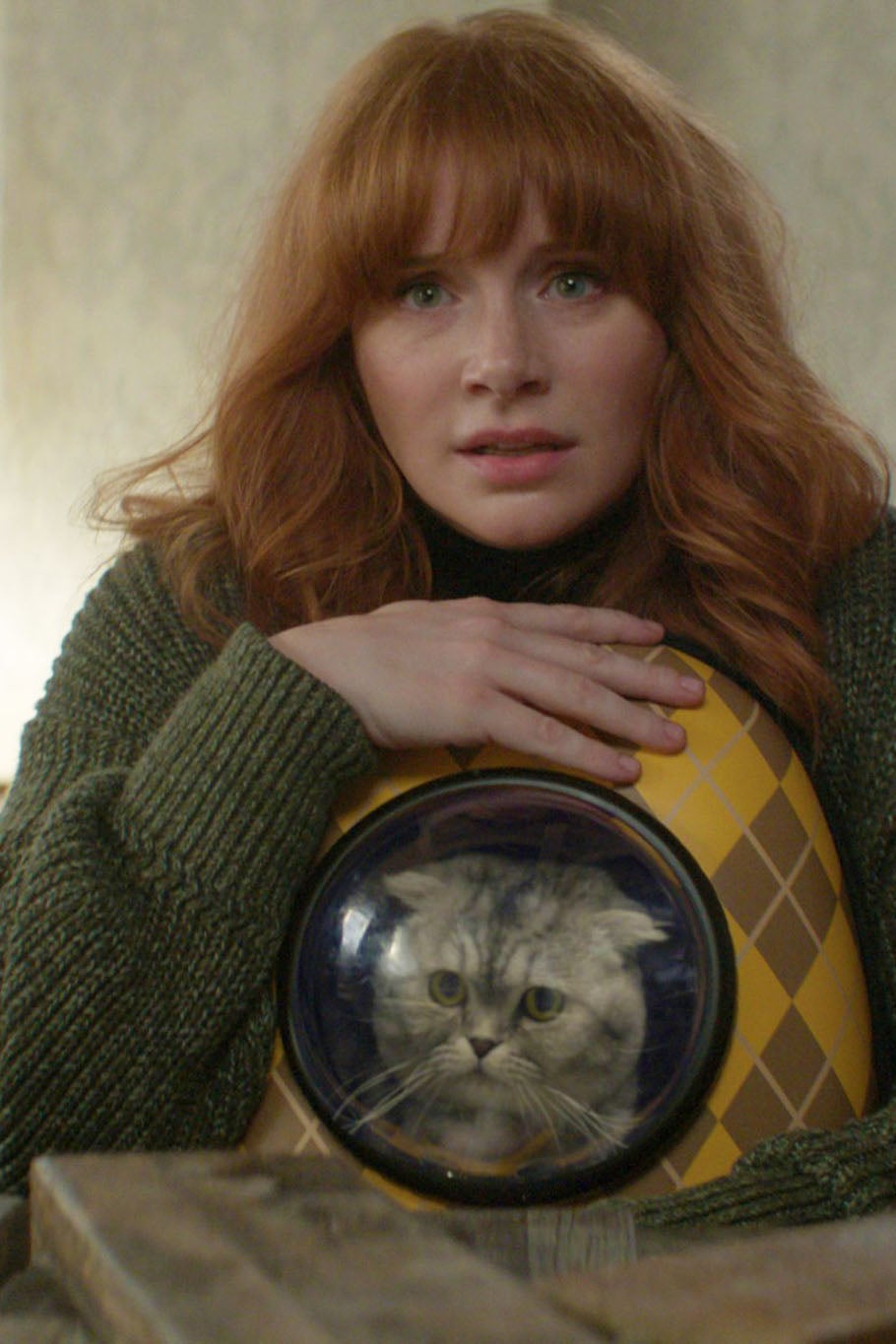
It also means she’s able to divorce her emotions from projects that don’t do so well. Last year’s Argylle, for instance, was an incredibly expensive action film for Apple TV+ in which Howard played a novelist drawn into a world of espionage – it cratered at the box office. Similarly, Shyamalan followed up The Village with the infamous Lady in the Water, in which Howard played a water nymph who washes up in an apartment swimming pool. Critics weren’t kind.
“You can always see it coming while you’re making it,” Howard says. “I’ve never been shocked when something doesn’t work. But I’m just an actor – you’re there to serve a director’s vision. If a movie doesn’t turn out the way that you envisioned, you can barely feel disappointed because it’s not yours. You’re not the person who’s building the thing.” Her dad, she adds, has always – and understandably – taken on the emotional burden when one of his films doesn’t do well. “It blows him away that I don’t do that.”
She remembers seeing his heartbreak when his Tom Cruise/Nicole Kidman period drama Far and Away bombed in 1992 (Howard was 11), and how he turned to Clint Eastwood – a man who has experienced incredible creative highs and contrasting lows in his career – for advice. “He said, ‘Ronnie – a career is like a season of television. You’ve got 24 episodes, some of the episodes are going to be bad, some are going to be serviceable, maybe a little forgettable, and maybe five of those episodes are going to be really strong and last’.”
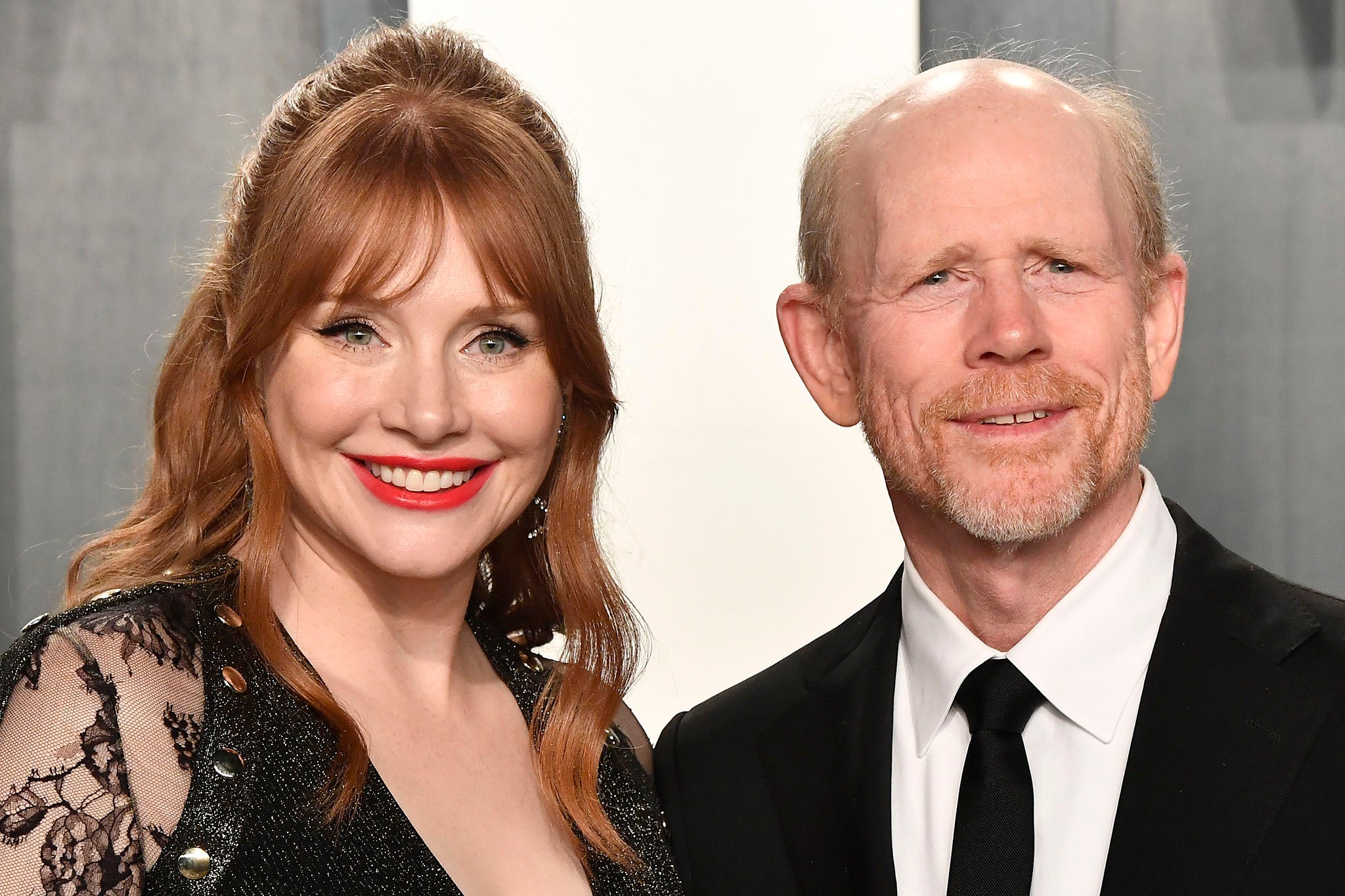
It’s an ethos she carries with her today, but she admits that it’ll probably become harder to embrace once she starts directing feature films herself. There, the buck really will stop with her. If Howard has acted less in the last few years, it’s because she’s spending more time behind the camera – she’s directed episodes of The Mandalorian and The Book of Boba Fett, as well as the Apple TV+ documentary Dads. But she still feels a little green.
“When I ultimately direct a narrative feature, I’m gonna want to work with a director of photography who’s really experienced, because I don’t want to be the most experienced person on a set,” she says. “I really shouldn’t be.” It’s why she’s grateful for the Star Wars work. “I’m shown so much respect and I’m given a lot of freedom, but also there are guardrails because it’s such a big franchise. And at this point, I definitely still need those.”
And the blood and guts, of course. Can’t forget the blood and guts.
‘Deep Cover’ is available exclusively on Prime Video from 12 June
15 terrible movies directed by great actors, from Ryan Gosling to Johnny Depp
‘He threatened my career’: 22 actors who didn’t get along with their directors
The 8 best movies we saw at Cannes Film Festival 2025
Brad Pitt: Twenty years of controversy, yet his golden halo is still intact
The drag queen thriller too controversial for the UK: ‘It was queers policing queers’







